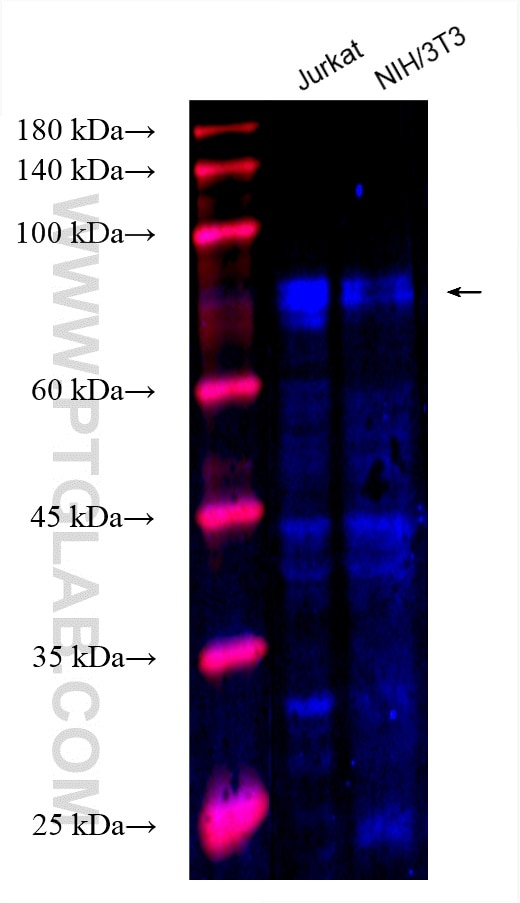Tested Applications
| Positive WB detected in | Jurkat cells, NIH/3T3 cells |
Recommended dilution
| Application | Dilution |
|---|---|
| Western Blot (WB) | WB : 1:500-1:1000 |
| It is recommended that this reagent should be titrated in each testing system to obtain optimal results. | |
| Sample-dependent, Check data in validation data gallery. | |
Product Information
CL750-66216 targets TLE1 in WB applications and shows reactivity with human samples.
| Tested Reactivity | human |
| Host / Isotype | Mouse / IgG2b |
| Class | Monoclonal |
| Type | Antibody |
| Immunogen | TLE1 fusion protein Ag21327 Predict reactive species |
| Full Name | transducin-like enhancer of split 1 (E(sp1) homolog, Drosophila) |
| Calculated Molecular Weight | 83 kDa |
| Observed Molecular Weight | 85-95 kDa |
| GenBank Accession Number | BC010100 |
| Gene Symbol | TLE1 |
| Gene ID (NCBI) | 7088 |
| RRID | AB_3084890 |
| Conjugate | CoraLite® Plus 750 Fluorescent Dye |
| Excitation/Emission Maxima Wavelengths | 755 nm / 780 nm |
| Form | Liquid |
| Purification Method | Protein A purification |
| UNIPROT ID | Q04724 |
| Storage Buffer | PBS with 50% Glycerol, 0.05% Proclin300, 0.5% BSA, pH 7.3. |
| Storage Conditions | Store at -20°C. Avoid exposure to light. Stable for one year after shipment. Aliquoting is unnecessary for -20oC storage. |
Background Information
TLE1 (Transducin-like enhancer protein 1) is a transcriptional corepressor and binds to a number of transcription factors. It can inhibit NF-kappa-B-regulated gene expression and the transcriptional activation mediated by FOXA2, and by CTNNB1 and TCF family members in Wnt signaling. The effects of full-length TLE family members may be modulated by association with dominant-negative AES (PMID: 10660609). TLE1 is highly expressed in postnatal brain (PMID: 29758293; 27852056).
Protocols
| Product Specific Protocols | |
|---|---|
| WB protocol for CL Plus 750 TLE1 antibody CL750-66216 | Download protocol |
| Standard Protocols | |
|---|---|
| Click here to view our Standard Protocols |



